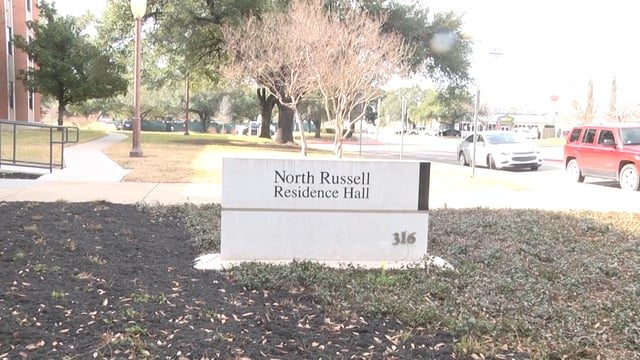By Christina Soto | Broadcast Reporter
Students gathered in the North Russell classroom for a session called “Talk with Natasha.”
Lusaka, Zambia junior Jessica Schurz and San Diego, Calif., junior Josh Reil, community leaders of North Russell Hall put on the event to share Dallas sophomore Natasha Nkhama’s story and to touch on racial reconciliation and the importance of forgiveness.
“The goal of this event was to get people to bridge the gap between races and to give them practical ways to do so,” Reil said.
Nkhama was a victim of a racial slur that occurred on campus. She said she was pushed off the sidewalk by someone who she said told her “no n—– on the sidewalk” and then claimed to be making America great again. She said she has now forgiven the person who did that to her.
“It was kind of like a bad dream that didn’t feel real. I have a lot of friends that don’t believe that racism still exists, and that’s why I made that video,” Nkhama said.
In response to the incident, more than 300 people walked in solidarity with Nkhama.
“There was a lot support; it wasn’t just an online thing, people took a lot of physical action,” Nkhama said.
Big Spring junior Jennie Steel also shared her story and how she came from a predominately white community. She said being at Baylor has given her the opportunity to make a diverse group of friends.
Steel and Nhkama both shared ways to achieve racial reconciliation. Nhkama said one should reach outside the familiar and take a genuine interest in getting to know someone that one may not have anything in common with.
Nkhama also said that black people seem to be defensive and more exclusive, and they need to be inclusive and inviting to everyone.
“When people ask about your culture, people get on the defensive side, and people should approach those conversations with an open mind because that person has something to teach you,” Nkhama said.
Nkhama and Steel both said it is important to be aware of situations and events that don’t only effect you, but also those around you.
Steel said that white people need to understand they are privileged and that understanding that can help with racial reconciliation.
“Being white, recognizing your privilege, humbling yourself with that and knowing that this person is just as equal as me,” Steel said.
Nkhama said that if someone says something offensive, it’s important to take a minute before responding.
“I don’t think I wouldn’t responded the way I did if I didn’t have that relationship with God,” Nkhama said. “Take a step back and see how I can be a reflection of love.”
Nkhama said change is never comfortable but is possible.
“This is going to be hard, but if I want to see something change I am going to have to do something that I don’t want to do,” Nkhama said.



